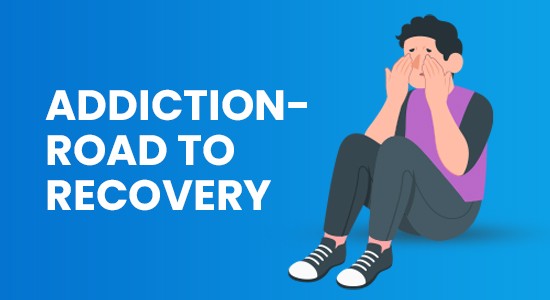ADDICTION- ROAD TO RECOVERY
ADDICTION- ROAD TO RECOVERY
Recovery from addiction is a complex and challenging process. Understanding the stages of recovery is crucial for both individuals seeking recovery and healthcare providers as it helps in designing appropriate interventions and identifying potential barriers to change.
The first stage of recovery is precontemplation. In this stage, individuals are not yet aware of their addiction problem or do not recognize it as a problem. They may not see the negative impact their addiction is having on their life or those around them. For example, a person who drinks heavily every weekend may not see any problem with their behavior and might even feel like they are just having fun.

The second stage is contemplation. In this stage, individuals are aware that they have a problem with addiction and are considering changing their behavior. However, they may feel ambivalent or uncertain about the benefits and challenges of change. They may also experience fear, shame, or guilt about their substance use, which can make change difficult. For example, someone who has been smoking for many years may recognize the health risks associated with smoking but may also feel that quitting is too difficult or that they will lose a coping mechanism if they quit.
The third stage is preparation. In this stage, individuals have made a commitment to change and are actively preparing to take action. This may involve seeking support, setting goals, or making a plan for change. For example, someone who wants to quit smoking may talk to their doctor about treatment options, plan a quit date, and start reducing the number of cigarettes they smoke per day.
The fourth stage is action. In this stage, individuals are actively making changes to their behavior and lifestyle to address the addiction problem. This may involve seeking treatment, participating in therapy or support groups, or making lifestyle changes. For example, someone who has a problem with compulsive gambling may attend Gamblers Anonymous meetings, establish a budget, and avoid going to places where they are likely to gamble.
The final stage is maintenance. In this stage, individuals have successfully made changes to their behavior and are working to maintain their progress and prevent relapse. This may involve continuing therapy or support, developing coping strategies, and making ongoing changes to their lifestyle. For example, someone who has quit smoking may continue to attend support groups, use nicotine replacement therapy, or engage in healthy habits like exercise or meditation to prevent relapse.
In each stage of recovery, individuals may face challenges and barriers that can make change difficult. These challenges may include social stigma, lack of support, or fear of failure. Healthcare providers can help individuals overcome these challenges by providing appropriate interventions and support tailored to their specific stage of recovery.

In conclusion, the five stages of recovery in addiction are crucial in understanding the process of change and developing interventions to support individuals seeking recovery. By recognizing the stages of recovery, individuals and healthcare providers can work together to develop appropriate strategies and overcome potential barriers to change. “Whether it is smoking, substance abuse, or gambling, recovery is a process that takes time, effort, and commitment but with the right support and treatment, it is achievable.”
Overall, research studies support the use of the Transtheoretical Model in addiction recovery and demonstrate the importance of understanding and addressing the individual’s stage of change to facilitate successful recovery.


